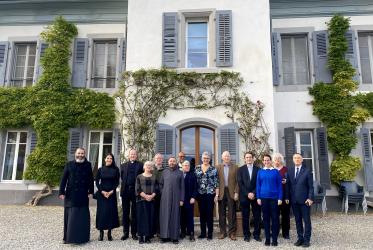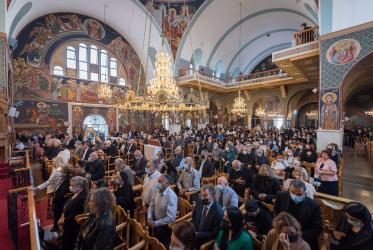by Anna Marie Aagaard
Documents from Sub-committee III
(Chania, Crete, August, 2000)
A. Ecclesial cultures
1. The "Special Commission" serves a World Council of Churches in which neither the Orthodox nor the Protestant member churches constitute a monolithic ecclesial culture.
2. Attention to the different approaches to doctrinal, social and ethical questions among Protestants may overshadow the importance of the fact that a number of ecumenical accords and agreements make Protestant churches acknowledge each other as churches - as manifestations in time and history of the one, holy, catholic and apostolic church.
3. Because of the assumption (often tacit) that a cultural script shaped by Western religious tradition, Western political and technological history, and the Enlightenment is normative, Orthodox Christianity appears as an unfamiliar and undifferentiated "other" to "Westernized" eyes (wherever they are located). Thus it is easy to overlook the differences of ecclesial culture within Orthodoxy.
4. Different cultural-historical-ecclesial scripts also impact Orthodox Christianity. The recent theological agreement that the Oriental and the Eastern families of churches "have always maintained the same authentic Orthodox Christological faith and the unbroken continuity of the apostolic tradition" has not yet led to full sacramental unity among these churches.
5. Theology becomes empty if it is not grounded in a particular Christian worship, but it does not follow that theology can replace the first-order language of prayer and praise. Faith cannot be reduced to an inert deposit of doctrinal formulations that only need to be handed on. Different ways of theological reasoning and of organizing Christian practices in different historical eras and in different cultures need not be church-dividing. No theological attempt to articulate the logic or grammar of faith can be absolutized without committing idolatry.
6. Awareness of even stark differences within both the Protestant and the Orthodox traditions does not by itself remove a "them versus us" horizon for ecumenical endeavours within the WCC.
7. The "them versus us" dynamics is reflected in WCC's study programmes and administrative structures. It feeds on the illusion that communal cultural-historical-ecclesial scripts are immune to the global processes variously designated as "post-modern pluralism" and "the culture of death".
8. Gone, for most people in most parts of the world, is the confidence that everything hangs together in some way, can be placed within a single system of truth, or subsumed into one story. Stable identities and historical continuities are disappearing. While this changed situation does allow for recognition of the different tales or plots which people inhabit, it also has a death-dealing side: the severing of human bonds, the untrammeled hoarding of goods and riches, the pollution of the earth, the explosion of spiritual hedonism. Like most people in most societies, most Christians (of whatever ecclesial tradition) are "multiple selves", deeply influenced by these death-dealing processes.
9. Christians contribute, whether actively or in numb complacency, to the terrors, confusions and uncontrollable destructiveness which influence individual and collective identity.
10. It is not enough to recall that Christians have never claimed exemption from sin. Sin occurs in a changed context - as do the various ecclesial disciplines, symbols, rites and theological languages. In our present world it is not too difficult to recognize how the ecclesial cultures we cherish have too often served ethnic and national interests, and the desires of caste and class.
11. The "them versus us" mindset hides the real sting and the genuine ecumenical challenge behind a veil of integral ecclesial-cultural traditions. Every Christian church faces the immense task of becoming a faith community of shared practices in which people with "multiple selves " might learn nothing less than to shape their speech, analyze the world and live their lives in relation to "one Word once spoken in one life lived and one death undergone" .
B. Telling God's story
12. Words take meaning according to the company they keep (N. Lash).
13. On the lexical level, a word -- e.g., "father" -- has a range of meanings based on previous usage. Its exact meaning depends on "the company it keeps" in a specific situation. The pragmatic level of language refers to the use of words -- that is, to the company of practices which makes words take and sometimes change meanings. Confessing God as "God, the Father, Son and Holy Spirit" makes a specific use of words. These words take their meaning from the Bible, worship and community practices, by which Christians learn to situate themselves in relation to God as a Father who, unlike human fathers, is always self-giving and who can beget. "Gender-based language is not eo ipso a gender-biased language" (N.J. Gregersen). The allowed range of transfer of meaning from non-religious to religious language is first of all determined by the "grammar of faith", the community-sustaining rules for regulating the use of language. While these rules may be articulated in creeds and in doctrinal or ethical statements, most often they are simply assumed and built into rituals, forms of piety, assessments of the world and of history and accepted social practice.
14. Over the centuries Christian theologians have expended much energy on discussing the allowable range of transfer of meaning from culture to worship (cf. in the Latin tradition, Augustine's On Christian Doctrine). Our theological laziness is manifested in the transfer of wh atever meanings we encounter in the cultural company we keep. Have we no longer anything specifically Christian to say, any specific boundaries to set up against misogynistic misuse, when in accordance with Scripture we name the God of Jesus Christ, "God the Father, Son and Holy Spirit"?
C. The Trinitarian Basis
15. Membership in the World Council of Churches presupposes acceptance of the trinitarian Basis. 1
16. The Basis is not a creed; yet like a creed it functions as a declaration of identity. This is where we stand as particular churches and as a fellowship of churches. This is what we believe about God, about Jesus Christ, about our world and our common calling.
17. Trinitarian language did not fall from heaven. It was coined in the early church, and it takes meaning in the present company of believers. What we mean when we say "one God, Father, Son and Holy Spirit", we learn in the central practices which make up the ligatures of a particular community.
18. Most WCC member churches with historical ties to the Reformation consider that these central practices include the gathering, the washing, the meal and diakonia -- in short, "Word and Sacrament". In this setting, the creed (the Apostles' Creed, the Nicene Creed or both) functions as a summary of the rules that govern Christian use of the word "God". That is, the creed functions both as the guide to Scripture and Christian living and as the criterion of sound teaching.
19. A creed or similar summary of Christian faith is not a shopping list on which items may be added and from which they may be removed. Rather, it directs us thus to worship God and identify our tasks in the world, so that the biblical story we tell - from the creation and the patriarchs to the end of time - becomes the story we inhabit. Reciting the summary formulation means confessing: this is the one God in whom we believe. This is the "mystery of faith" in which we live, and work, and hate, and die, and hope.
20. To prevent the self-deception that it is ultimately we who produce the company of believers which makes it possible to speak truly of God and to live to the glory of the triune God, the early creeds link the communion of saints and the forgiveness of sins.
21. The Nicene Creed refers explicitly to baptism as the sacramental means of the forgiveness of sins: "We believe in one holy catholic and apostolic church; we acknowledge one baptism for the forgiveness of sins". Forgiveness of sins marks the communion of the Spirit. Without the former, the latter becomes an illusion. Baptism for the forgiveness of sins cannot be separated from learning to live as a Christian community, that is, living in relation to the God of Jesus Christ and thus glorifying God, the Father, Son and Holy Spirit.
22. Acknowledgment of the WCC's trinitarian Basis without mutual acknowledgment of the baptism in the name of one God, the Father, Son and Holy Spirit for the forgiveness of sins makes no sense.2 It can only feed the suspicion that some member churches are faking their commitment to live to the glory of the triune God and do not care about upholding trinitarian rules for Christian worship and doctrine. Some Christians will indeed argue for telling God's story without using a trinitarian key to the Scriptures and without identifying the communion of saints, and baptism for the forgiveness of sins, as the company of forgiven sinners that gives meaning to the words of the story. It does not make sense for them to join a fellowship with a trinitarian Basis.
D. Authority
23. Words change meanings. This is a matter not only of changes in their connotations but even more fundamentally of the change of language itself. The nature of the meanings themselves has radically changed. An example: the biblical ruah does not distinguish between "wind", "breath", "Spirit as both the Giver and the gift of life". The distinction between the "literal" and the "metaphorical" is of recent date, allowing for the current meaning of "wind" and "breath". We cannot by a fiat undo historical developments and expect our contemporaries to re-enter Ezekiel 37, for example, in a pre-modern way. We cannot restore a primal participation in an undifferentiated universe; rather, in the company of believers we must slowly and consciously learn a Christian language that sees the world charged with the grandeur of God.
24. Critical awareness of changing meanings permeates the early Greek and Latin theology, and it continues to be a task of Christian theology. The task includes attention to drawing the fine line between the affirmation of tradition and the exercise of (an illusory) control which maintains that words cannot change meanings.
25. Whose theology? Behind this question lies the question of authority in the church. Every church has some institutionalized ways of acknowledging or disqualifying theological positions on doctrine and ethos. The authority may be vested primarily in the configuration of Scripture, liturgy and creed (mainline Protestant churches) or in certain traditioned practices (e.g. the Quakers). But no matter what the configuration, the authority is always mediated by human beings. It is human beings who exercise authority in the churches, not Scripture or doctrines or ordinances in and of themselves. However it is configured, authority is supposed to "stop the discussion" -- not forever, perhaps, but for the moment, so that the community can go beyond the provisional discussions of meanings to make the actual witness that is needed.
26. Ecumenists continue to discuss on the various configurations of authority and the parameters for understanding the ordained ministry, including the episkope.3 To my knowledge, this is seldom if ever accompanied by organized reflection on the company these conversations keep in most parts of the world. In the milieus in which these discussions are going on, most people are questioning every sort of authority. The processes of modernity have led to the equating of authority with control. Where given horizons for meaning and value are not accepted -- because everything receives meaning and value by my autonomous choice -- the task of the churches is a much more daunting one than simply refining theologies that take authority for granted. The task is nothing less than providing examples of communities in which authority is credible because it is a community-sustaining and community-nourishing factor. In the experience of most of our contemporaries, such examples are few and far between.
E. Moral formation
27. Practice may not make perfect, but practices do make morals.
28. The studies on "ecumenical ethical engagement, moral formation and the nature of the church"4 point to the return of virtues in moral reflections. At the core of this is an understanding that a person's character affects and shapes moral judgment. Since moral judgment is tied to a particular social context, it does not make sense to focus ecumenical discussions on single moral issues. Every moral judgment comes with particular ways of shaping the community practices and consequently character.
29. This is contrary to the dominant account of moral life, which denies that there is a relevant relation between acts and the person performing the acts. Rooted in modernity's assumption of a "neutral" or "objective" description of action, this view considers moral reflection to deal with specific actions independently of the persons involved. The premise is that agents and acts can be separated. It follows that conflicts about moral judgments can only be solved by recourse some objective truth accessible to a universal rationality.
30. Virtues are acquired and character formed via the focal practices that shape a particular community. Christians learn the forming (or malforming) practices in the company of believers; in other words, Christians learn to live "the Way" and become disciples of Christ in the church. To Christians, the language of character and the virtues is tied to an account of Christian life nourished by the examples of the saints and the wisdom of teachers.
31. "From the standpoint of the Christian tradition, the moral life requires not only formation but transformation in moral judgment. The moral life is inextricably tied to responsive friendship with the triune God and is enabled by such Christian practices as baptism, eucharist, forgiveness-reconciliation, and the interpretation of Scripture. Central to Christian convictions is the belief that it is an exceedingly difficult task to see and describe the world rightly and to think, feel, and act well. Accomplishing such a task requires a willingness to have one's life formed and transformed by the mystery of the Triune God" (L.Gregory Jones).
Literature:
- Confessing the One Faith. An Ecumenical Explication of the Apostolic Faith as it is Confessed in the Nicene-Constantinopolitan Creed (381), Geneva, WCC, 1999.
- John H. Erickson, The Challenge of Our Past: Studies in Orthodox Canon Law and Church History, Crestwood NY, St Vladimir's Seminary Press, 1991.
- Niels Henrik Gregersen, "On Gender Based or Gender Biased God-Language: Trinitarian Theology in the Wake of Feminist Criticism", Dialogue, Vol. 38, no. 2, 1999, pp.123-28.
- L. Gregory Jones, Transformed Judgment: Toward a Trinitarian Account of the Moral Life, Notre Dame IN, Univ. of Notre Dame Press, 1990.
- Nicholas Lash, Believing Three Ways in One God: A Reading of the Apostles' Creed, London, SCM Press, 1992.
- Gerard Loughlin, Telling God's Story: Bible, Church and Narrative Theology, Cambridge, Cambridge U.P., 1996.
- G. Limouris, ed., Orthodox Visions of Ecumenism, Geneva, WCC, 1994, which reprints a text (Sofia 1981) arguing for the inclusion of a reference to baptism in the Basis of the WCC (pp.87ff.).
- Christine Chaillot and Alexander Belopopsky, eds, Towards Unity: The Theological Dialogue between the Orthodox Church and the Oriental Orthodox Churches, Inter-Orthodox Dialogue, Geneva, 1998.
Notes:
- The Basis describes the World Council of Churches as "a fellowship of churches which confess the Lord Jesus Christ as God and Saviour according to the Scriptures and therefore seek to fulfill together their common calling to the glory of the one God, Father, Son and Holy Spirit" (WCC Constitution, Article 1).
- None of the texts on the WCC Basis and baptism in the dossier prepared by staff for the meetings of subcommittees I and IV reflects on the trinitarian character of the Basis and its function, or the relation of the trinitarian formula to the company these words keep and rely on for meaning. Some sentences in these texts refer to the acknowledgment of Jesus Christ as the decisive centre of all reality, and one of them points correctly to the Basis as an "affirmation of faith, practice and resolve". What this implies, given a trinitarian Basis, is not spelled out.
- Cf. the recent Faith and Order studies The Nature and Purpose of the Church, Faith and Order Paper no. 181, Geneva, WCC, 1998, and Episkope and Episcopacy and the Quest for Visible Unity, ed. Peter C. Bouteneff and Alan D. Falconer, Faith and Order Paper no. 183, Geneva, WCC, 1999.
- Cf. Ecclesiology and Ethics, ed. Thomas F.Best and Martin Robra, Geneva, WCC, 1997.



